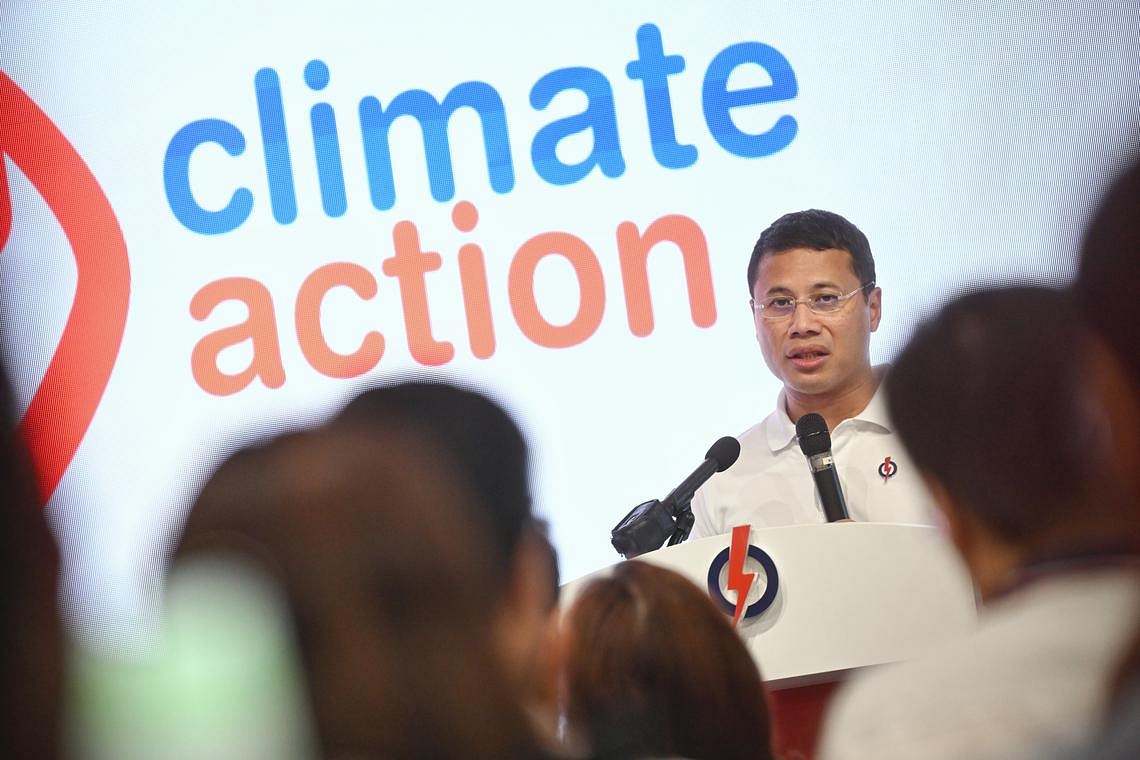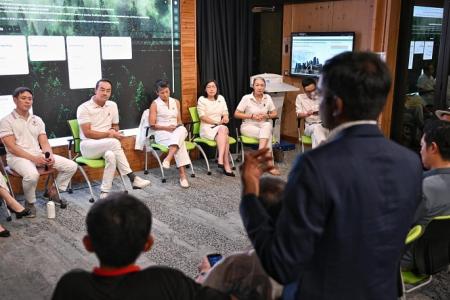PAP’s new climate action group to help SMEs go green
Laws to combat greenwashing and make sustainability a key criterion for all government tenders will be among nine recommendations set out in an upcoming parliamentary motion aimed at helping smaller firms decarbonise.
The motion will be one of the first major initiatives by the new climate action group launched by the People’s Action Party (PAP) on Jan 21.
“We have pushed very hard on tackling climate change,” said Nee Soon GRC MP Louis Ng, who co-chairs the climate action group.
“But at the same time, we don’t want to push businesses away. We know that they are a very important part of the equation. And so this motion will really be about how we can support businesses, especially the SMEs in this green transition.”
The upcoming motion – which will be tabled some time in 2025 – aims to help small and medium-sized enterprises (SMEs) with more resources on how to decarbonise and get access to sustainability consultants, and to encourage firms to report on their carbon emissions and waste.
Mr Ng said that many large multinational companies have made commitments to reduce their emissions, and may sometimes expect their suppliers – which include SMEs – to meet certain sustainability standards.
But smaller firms may not have the resources to do so, or lack the awareness of how to get there.
This is why it is important to ensure that these smaller businesses are not left out of the green transition, he said.
He noted that only a fraction of SMEs have tapped the $180 million Enterprise Sustainability Programme, which was introduced in 2021 to help local firms go green by providing training workshops, project support and financing.
He said only about 20 to 30 per cent of the companies that applied for the programme are SMEs.
“From our dialogues and on the ground, (we heard) that a lot of them are unaware of all the different programmes that we put out there to help them.
“And so awareness is a critical component,” added Mr Ng.
It was previously reported that only a third of SMEs have made significant decarbonisation progress, as compared with 80 per cent of larger enterprises.
“This motion will call for stronger support to help enterprises navigate the green transition, and ensure a just and inclusive transition towards a low-carbon society,” said PAP assistant secretary-general Desmond Lee, who launched the climate action group on Jan 21 at the Singapore Sustainability Academy at City Square Mall.

Senior Minister of State for Sustainability and the Environment Koh Poh Koon co-leads the new group alongside Mr Ng, who also chairs the Government Parliamentary Committee (GPC) for Sustainability and the Environment.
The nine recommendations that will be proposed in the parliamentary motion are:
- Publish a green transition handbook for SMEs, outlining the available grants and training, list of sustainability consultants, and steps to take for climate-related reporting.
- Raise awareness about the need for climate-related reporting, and how the green transition will increase a company’s competitiveness and profitability.
- Enable the sharing of resources and manpower, through government-supported mechanisms, to help companies implement sustainability initiatives.
- Provide SMEs with industry-specific data on emissions and energy usage so that firms can compare their progress against that of their counterparts. This can help firms set realistic goals and identify where they need to improve.
- Incentivise businesses to submit decarbonisation plans and report on their carbon emissions and waste.
- Make environmental sustainability a criterion for all government procurement contracts.
- Create an entity to govern and oversee the training of sustainability consultants.
- Introduce laws to tackle greenwashing, with whistle-blowing mechanisms.
- Introduce a Jobs Transformation Map for industry-specific green jobs.
This will be the fourth climate change motion in Parliament since 2021.
The first motion highlighted that climate change is a global emergency, the second one was focused on the green economy, while the third was on protecting Singapore’s marine spaces.
Some 80 per cent of Singapore’s greenhouse gas emissions come from about 50 facilities in the manufacturing, power, waste and water sectors.
While smaller firms are not major emitters, Mr Ng noted that they “form a huge part of our business community”.
“If you want a just and inclusive transition, it must include the SMEs as well,” he added. “Rather than wait for a few years when we might mandate that everybody has to do climate reporting, I think it’s much better if we are proactive.”
From the 2025 financial year, all listed companies in Singapore must submit climate-related disclosures.
The climate action group is one of two groups which the PAP has created to address key national issues that cut across traditional demographic lines.
The second, a mental health group, was launched in late 2024.
Concerns about mental health and climate change came to the fore during an exercise in the past year to refresh the ruling party, and also over the years in conversations with activists and Singaporeans.
Apart from the parliamentary motion, PAP’s climate action group will advocate for policy reforms to fight climate change and further move the needle on the 2030 Singapore Green Plan. To that end, five committees have been formed under the group to align with the five Green Plan pillars of City in Nature, energy transition, green economy, resilient future and sustainable living.
The City in Nature committee, led by Ms Nadia Ahmad Samdin (Ang Mo Kio GRC), will push for the conservation of nature spaces while striking a balance with urban development. It will also work with various organisations to manage human-wildlife conflict.
Ms Poh Li San (Sembawang GRC) leads the Energy Transition committee that will propose policy changes to help industries, homes and the transport sector increase their use of greener energy.
The Green Economy committee, led by Mr Don Wee (Chua Chu Kang GRC), aims to develop policy recommendations that support the country’s transition to a low-carbon economy while safeguarding social equity and environmental sustainability. This comes as Singapore aspires to be a hub for green finance and carbon trading.
Ms Carrie Tan (Nee Soon GRC) will helm the Resilient Future committee, which will look at boosting the country’s food security and integrating nature-based solutions in buildings to make environments cooler for residents and workers.
The Sustainable Living committee, led by Ms Hany Soh (Marsiling-Yew Tee GRC), will introduce initiatives to encourage citizens to make more eco-friendly choices.
With the next general election set for no later than November 2025, Dr Koh was asked whether climate change resonates with voters and is expected to be a hot topic during the election season.
He said the climate action group is not tied to the election, but is a signal that the party is continuing to place climate action at the forefront of what it does.
“The future of Singapore depends on our policy actions that will actually make concrete changes to help mitigate some of the impacts of climate change,” he added.
Get The New Paper on your phone with the free TNP app. Download from the Apple App Store or Google Play Store now


